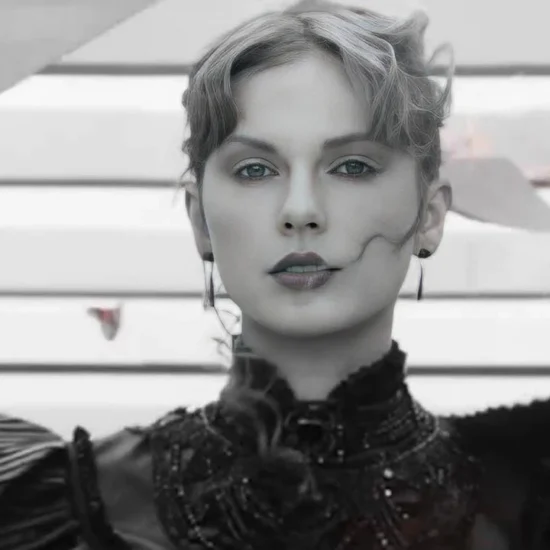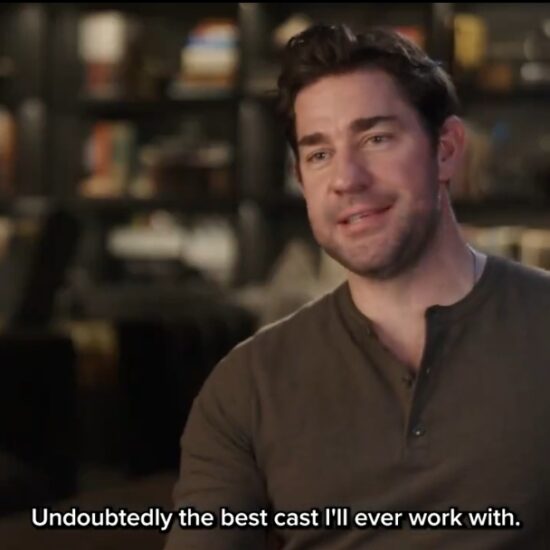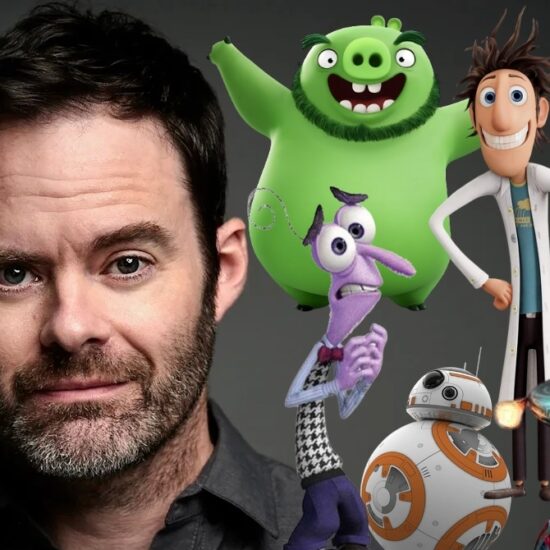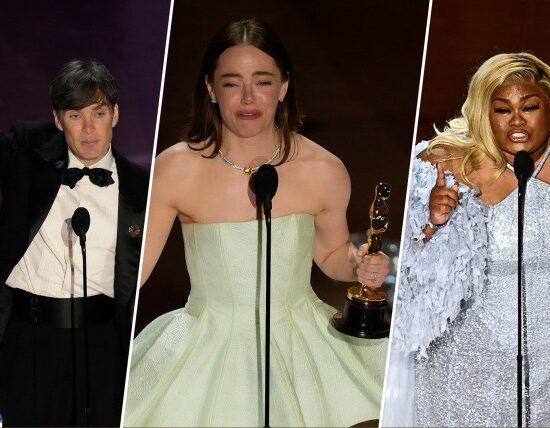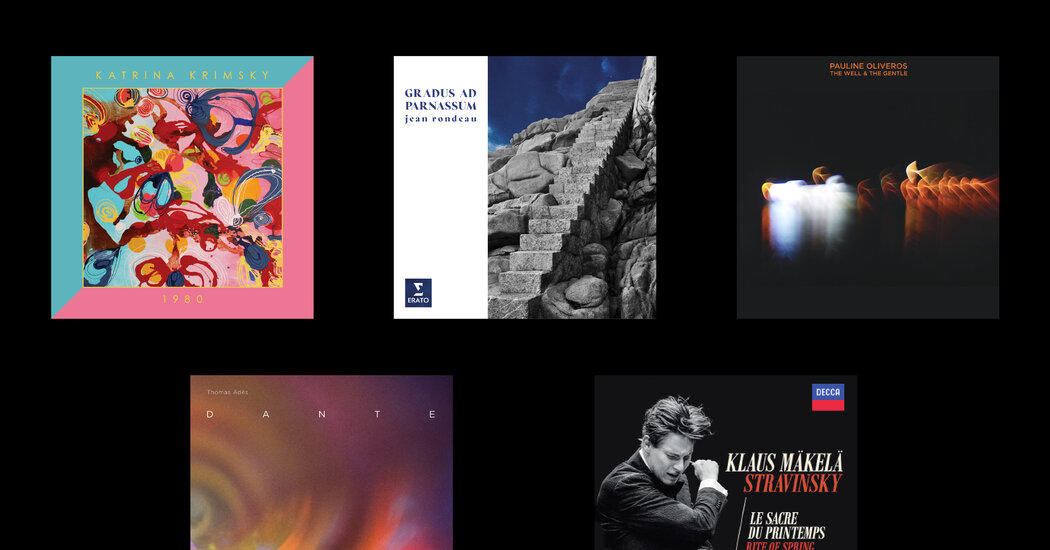
Thomas Adès: ‘Dante’
Los Angeles Philharmonic; Gustavo Dudamel, conductor (Nonesuch)
It’s a great joy — a relief, even — to revisit a new work and feel just as ardently positive about it as at the premiere.
Take Thomas Adès’s evening-length “Dante,” whose concert premiere at the Los Angeles Philharmonic I attended last spring. My review, back then, was one of borderline raving enthusiasm. Now, as I listen to the recording, that seems like the only way I could have responded.
In person, “Dante,” a three-part journey through the world of “The Divine Comedy” by way of Liszt and other oblique influences, was a cosmic, at times movingly spiritual and often overwhelming experience. On disc, much of that survives intact. What comes through most clearly is the Philharmonic’s thorough commitment under Gustavo Dudamel. This ensemble is at its finest as a shepherd of contemporary music; here, it sounds as if Adès’s score were ingrained in the bones of its players.
“Inferno” fares best on disc: timelessly entertaining, a high-octane tour through the circles of hell. “Purgatorio,” which featured amplification and acoustic design in the hall, is comparatively flattened, its preserved recording of an ancient Jewish prayer less stirringly grand when balanced with the orchestra. And it’s difficult for “Paradiso” to retain its hypnotic enchantment through headphones and surrounded by the visual distractions of daily life. But, tellingly, the heavenly choral finale still has the power to stop you in your tracks. Some music is effective no matter how it’s heard. JOSHUA BARONE
Stravinsky: ‘The Rite of Spring’ and ‘The Firebird’
Orchestre de Paris; Klaus Mäkelä, conductor (Decca)
The last time I reviewed a Klaus Mäkelä recording — a cycle of the Sibelius symphonies that I politely described as having “its ups and downs” — this Finnish maestro was merely the chief conductor of the Oslo Philharmonic and the music director of the Orchestre de Paris. He was 26 then. He is 27 now.
Much of the classical music industry has since abased itself at Mäkelä’s feet. Major American orchestras, of the kind that ought to know better, are competing to acquire his future services; from 2027 to 2032, at least, he will lead the Royal Concertgebouw in Amsterdam — the orchestra of Willem Mengelberg, Eduard van Beinum and Bernard Haitink, one of the most storied ensembles of them all. He has given himself no time to grow, and nowhere to hide.
That’s a shame, because this Stravinsky recording is dreadful. Mäkelä misconceives “The Rite of Spring” to an almost incomprehensible degree; the riotous ballet is rendered so calmly, so tamely here that it could qualify for an “easy listening” playlist. Much of it is inert, with pretty detail piled upon pretty detail in the service of no conceivable dramatic purpose. There is no atmosphere, no energy, no drive, no gore; compare it to the “Rites” that Michael Tilson Thomas and even Gustavo Dudamel recorded at roughly the same age, and the gulf in inspiration is painfully stark.
It speaks ill of Mäkelä that this has been released at all. If anything, “The Firebird” is worse. DAVID ALLEN
Pauline Oliveros: ‘The Well & the Gentle’
Relâche (Important Records)
Pauline Oliveros is, thankfully, already a key figure in conversations about Minimalism. Excerpts from this composer-performer’s influential text “On Sonic Meditation” appear in the new scholarly collection “On Minimalism,” and since her death in 2016, her works have remained present at New York concerts, including through a recent tribute by the flutist Claire Chase.
This classic double album from 1985, though, has been difficult to track down in recent years, so its recent reissue is cause for celebration. The first disc presents two pieces performed by Oliveros, heard on accordion, and the contemporary specialists of the ensemble Relâche. (You can hear two versions of them: from a studio-like setting, and from a live take.)
“The Well” was originally conceived by Oliveros, Relâche and the dancer-choreographer Deborah Hay for performances in Chester Springs, Pa.; “The Gentle” was developed around the same time, for the same instrumental forces. On the studio take of “The Well,” Oliveros dazzles with her accordion playing over the first minutes; then later, as the members of Relâche join, there is a realization of her interest in group listening and interdependence. (Aside from navigating her scales and rhythms, players use “guidewords” — “listen, merge, match, support and soar” — to structure the performance.) The second disc gives another Oliveros accordion master class, this time solo in a Cologne cistern, with a resonant finale in her take on “The Gentle.” SETH COLTER WALLS
‘Gradus ad Parnassum’
Jean Rondeau, harpsichord (Erato/Warner Classics)
The modern piano has shamelessly infiltrated the vast repertoire originally written for harpsichord. So why shouldn’t a harpsichordist return the favor? That’s the question being posed, in essence, by Jean Rondeau when he takes on piano works by Haydn, Mozart, Beethoven and even Debussy on this quietly audacious album, a reflection on influence, transcription and re-creation whose Latin title means “steps to Parnassus,” the home of the muses in Greek mythology.
“Gradus ad Parnassum” has for centuries been a name for artistic instruction guides and studies, as well as a seminal counterpoint treatise by Johann Joseph Fux, whose resplendent Chaconne is Rondeau’s penultimate track. The album’s form is a chronological arch, bookended by Palestrina ricercars from the Renaissance and receding back in time after advancing to a 20th-century midpoint: a ruminative, persuasively fluid “Doctor Gradus ad Parnassum,” Debussy’s nod to the “Gradus” exercise tradition.
Earlier, Rondeau’s rendition of Haydn’s Sonata No. 31 in A flat is elegant, yet also fierce in its counterpoint. He plays a pair of pieces from Muzio Clementi’s “Gradus” collection, and flanks the Debussy with little-played, moodily lyrical Beethoven preludes. The second of these is followed by famous Mozarts: the D minor Fantasia and the “Sonata Facile” Andante, both lush and eloquent — examples of Rondeau’s gift at slow tempos for conveying a sense of artful yet in-the-moment experimentation, of searching without seeming labored. ZACHARY WOOLFE
‘1980’
Katrina Krimsky, piano (Unseen Worlds)
I spent last weekend at the 92nd Street Y, New York, for a three-concert festival devoted to the once-neglected music of Julius Eastman. The restoration of his work to the world of modern American music is a great gift, yet there are still other voices missing.
Take Katrina Krimsky, the pianist behind this recent archival release. Recorded live in 1980 at the Creative Music Studio in Woodstock, N.Y., her solo recital is too much fun to have been unheralded for so long. (The studio’s co-founder, Karl Berger, died at age 88 earlier this month.) The first track, “Soundscape,” barrels along in Minimalist fashion at first. But as the chordal relationships change, Krimsky incorporates jazz locomotion, gradually and naturally. Halfway through, the pulse drops out, and we’re in a more spare universe of European modernism. It’s a blast to hear that transition — as well as Krimsky’s subsequent move back to harder-driving material and the opening sound world.
Krimsky collaborated with La Monte Young, and performed in the Carnegie Hall debut of Terry Riley’s “In C” in 1967. Intriguingly, promotional material for the Unseen Worlds release also lists her affection for figures like Karlheinz Stockhausen and Woody Shaw. All those fascinations can be heard in this fine set: a release that reminds us that for all the attention paid to Minimalism, its history can still surprise. SETH COLTER WALLS








